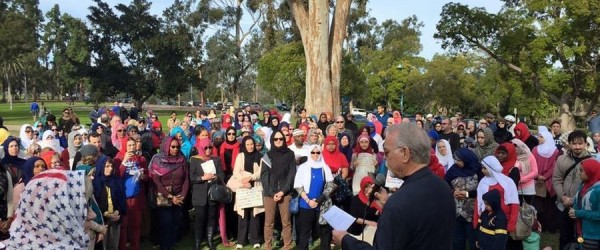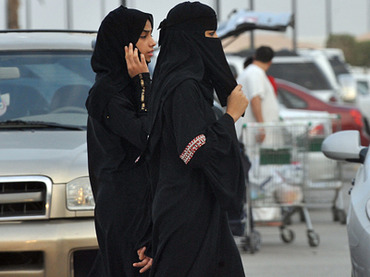David Cameron has been accused of stigmatizing Muslim women after he announced plans to help them learn English and warned that migrant spouses who fail language tests may have to leave the UK.
Cameron made it to the top headlines, when he decreed that Muslim women need to learn English, and came up with plans to outlaw gender segregation. But gender segregation is not something that only occurs at ‘radical’ events, according to activists interviewed in this piece.
Hundreds of community members donning colorful hijabs stood in solidarity with Muslim women in Balboa Park on Monday, in a demonstration supporting San Diego County Muslims.
Lauren Booth, half-sister of former Prime Minister Tony Blair’s wife Cherie, defends Muslim women’s rights to wear a veil in public during a heated discussion on “This Morning”.
Nigeria’s communications minister warned Wednesday telecoms companies about infringing the rights of veiled Muslim women. In a statement, Adebayo Shittu said his department had received complaints from women who had been asked to remove their veils in public when registering mobile telephone accounts.
“Amal Fertility” is a Mississauga-based support group for Muslim women struggling with infertility. The group offers monthly meetings and information sessions on topics such as adoption and foster care.
Oscar Quine, from the Belfast Telegraph, talked to Sara Khan, 35-year-old campaigner against Islamist extremism on gender-segregation on campuses, about how empowering women with education could lead to a stronger society.
On January 5, the Council on American-Islamic Relations offered a new service for the Muslim American families among its members: It released a guide titled “A Muslim parent’s guide to talking to children about acts of violent extremism.” It was meant to help parents guide their children through a new world in which the tide of Islamophobia, as well as the threat of violent extremism, is growing.
A young Queens woman who was photographed wearing her hijab in a Starbucks is suing the photographer and the Associated Press after the picture showed up alongside a controversial anti-hijab opinion piece in The Washington Post.
Women in Iran are protesting laws that require them to wear full hijab while driving by filming themselves laughing as they throw off the “visible symbol of oppression”.




